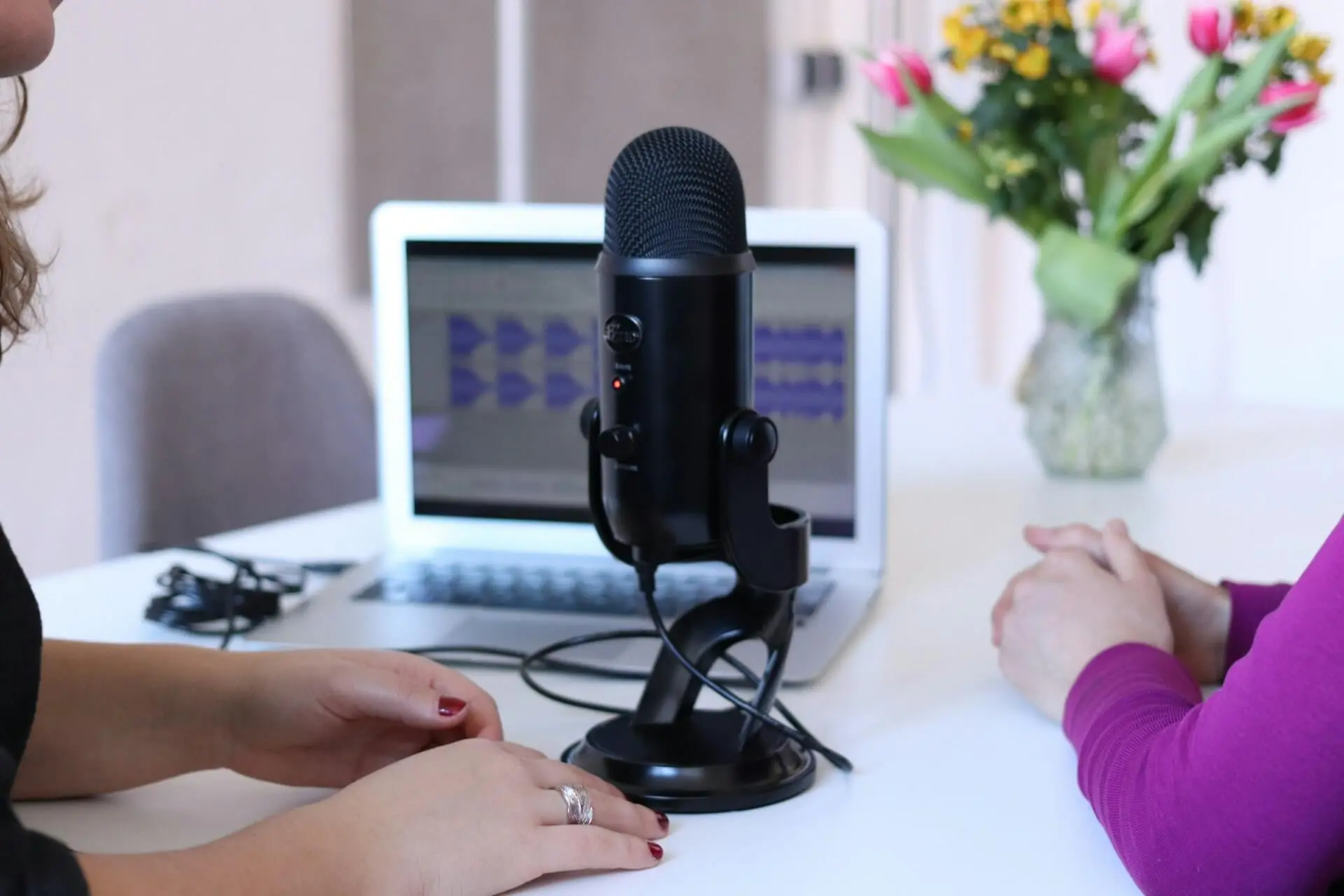Originally published May 7, 2024 , updated on September 17, 2025
You are at your desk to record a new podcast episode.
Coffee? Poured.
Mic? On.
Pets? Distracted by their favourite toys.
You know exactly what you want to talk about. You take a deep breath…and suddenly go blank. You wait a few minutes. Still nothing.
If this sounds familiar, you’re not alone. Even the most natural-sounding podcasts aren’t freestyled. They are backed by thoughtful writing from a podcast content writer. If you want to write podcast scripts that sound free-flowing, natural, confident, and conversational, this podcast writing guide is for you.
That’s where script writing for podcasts comes in. It turns scattered ideas into structured episodes that connect with listeners.
Let’s get started.
Why Does a Podcast Script Matter?

You could start recording a podcast episode without a script, but chances are you’ll drift off topic or lose track of the points you’ve already made. A podcast script fixes these problems. Rather than being a creativity killer, it’s a safety net.
And here’s the thing – podcasting is very competitive. There are over 584.1 million listeners worldwide, so every episode is a chance to win (or lose) attention. That’s why businesses now see podcasts as a powerful content marketing tool. They have become a key part of content marketing to build brand and authority, says the Content Marketing Institute.
Here is why a podcast script makes all the difference:
- A Podcast Script Keeps You on Track
Without a script, it’s easy to drift off topic. A script helps you stay on track and deliver the key points your audience came to hear.
- A Podcast Script Keeps Your Pacing Tight
Your pacing is a vital element that determines whether the audience stays with you. Awkward pauses and drawn-out rambling may make audiences stop listening.
A well-crafted script means a smooth flow throughout and keeps your audience engaged.
- A Podcast Script Makes You Confident
Your audience wants to hear confident and clear insights and observations.
A script plays a huge role in building your confidence. With a script, you know what’s coming next, and you’ll sound prepared and authoritative.
- A Podcast Script Helps You Sound Natural
This is probably the opposite of what you may think a script would do to your podcast.
Drafting scripts helps to get rid of clunky phrasing and makes your delivery feel relaxed. With a script, you won’t have to scramble for words, and your conversations will feel natural and genuine.
- Scripts Help You Ensure Consistent Brand Style
Your audience comes back because they know what tone and style to expect. Without a script, you might not always hit the same note.
A script ensures every episode has the same level of polish and clarity, whether you are doing it solo or with guests who have different podcast styles.
Key Elements of a Successful Podcast Script
A successful podcast script has elements that build the audience’s intrigue and anticipation. Without these elements, your script will sound bland, and that’s something you don’t want.
Podcasting is a great marketing opportunity, especially as the industry is expected to grow at 26.7% during 2025–2034.
Professional podcast writing services can help you master these essential elements from the start.
So, here are the must-have elements:
1. The Hook
This is the very first thing your listener hears, so it needs to grab their attention. You can use a surprising fact, a bold question, something controversial, or a short story, but make sure that your hook is not misleading or irrelevant to your topic.
Here’s an example of a hook:
“Don’t write your next podcast script until you know the script-writing secrets top podcasters never share.”
2. The Introduction
Your introduction sets the stage by sharing what the episode covers and why it matters. Forget the tired “Hi, I’m [name] and welcome to…” format.
Say what listeners gain by staying tuned.
If you have a guest, introduce them and explain why they are there and why the listener should care. Then wrap up the intro by naming yourself and your show.
3. The Main Segments
This is where the real value of your episode lives. It is the heart of your podcast that delivers on the promise you made in your intro.
Break the content into clear, focused sections. Each section should cover a specific idea or story. This keeps you focused and makes editing easier. It also gives your listeners a smoother experience.
4. Transitions
Transitions hold your episode together. These could be a quick recap or a question that leads into the next segment.
A good transition lets your audience know you are shifting to a new point. It keeps the flow smooth and natural and prevents episodes from sounding as if random audio clips have been stitched together.
5. The CTA (Call to Action)
Your episode should guide listeners to take the next step. This is the call to action. A CTA is simply what you want your audience to do after (or during) the episode.
Be clear and intentional. You could ask them to subscribe, leave a review, or join your community. Script the CTA in so that you never forget to say it.
6. The Outro
Your outro is the final impression you leave with your listeners. You need to leave them satisfied and curious, making them more likely to return.
A strong outro should give a quick recap of the key takeaway or most memorable moment and hint at your next episode or upcoming guest. It should also reinforce your CTA.
Podcasters United says that the outro should be under 30 seconds to leave the right impact.
How to Write a Podcast Script: A Step-by-Step Process for Podcasters

Whether you are handling script writing for podcasts yourself or working with professional podcast writing services, these steps will guide you toward success.
Here’s a step-by-step process that works for both beginners and seasoned podcasters.
1. Start the Episode With Your Big Idea
Every episode should have one core message. Everything that you share in your podcast must support this core idea.
Before you start writing, ask yourself: What’s the one takeaway I want my listeners to remember?
When you lock in your core idea, it helps you decide what to have in your script. This helps you stay on topic. The result is an episode that feels purposeful from start to finish.
2. Research Your Audience
Your podcast is made for your audience, so it’s essential to understand who you are writing for.
A skilled podcast content writer always researches the audience research to create content that truly resonates.
You can ask these three questions to understand your audience:
- Who’s listening? What is the audience’s age range, interests, industry, and level of knowledge?
- Why are they here? Do they want entertainment, education, motivation, or a combination of these?
- What do they struggle with? What are the pain points that speak to their needs and challenges?
You can find these insights through listener reviews, comments on podcast platforms, social media interactions, and direct feedback.
The better you know your audience, the easier it is to write a script that resonates with them.
3. Define Your Unique Selling Proposition (USP)
Your USP is what sets you apart from others in the industry. Is it your industry expertise? Is it your knack for storytelling? Or is it your fresh perspective?
Your script’s voice and tone should be guided by its purpose. If your show is known for humor, your script should use playful language. If you are the go-to for research-backed insights, your script should be packed with compelling facts and credible sources.
Professional podcast writing services will bring out your unique voice and make sure it shines through in every episode.
Your USP should shine through not just in what you say, but in how you say it.
4. Define Your Episode’s Angle
A strong angle prevents your episode from sounding like other similar shows.
For example, two podcasters may tackle “How to Start a Podcast.” One might focus on “Starting a Podcast with Zero Budget,” while the other explores “How to Launch and Attract 1,000 Listeners in 30 Days.” It’s the same topic but from completely different angles.
To find the right angle for the episode, answer these questions:
- What’s missing from other podcasts on this topic?
- What’s most relevant or urgent for the audience right now?
- How can your experience, humor, or network offer a fresh take?
Once you’ve identified your angle, weave it through your entire script – from the hook to the closing call for action.
5. Break Your Episode Into Segments
A well-structured episode means your listeners know where they’re going and can follow along effortlessly. Structure aids clarity and prevents confusion.
Structuring also helps your podcast content writer create a streamlined script. Clear segments help you organize your thoughts and present them logically. They guide your audience from point A to point B to point C without confusion.
They also make the writing process more manageable, allowing you to move seamlessly from one segment to another while building towards the conclusion.
Think of your segments as building blocks – supporting each other and your core message.
6. Outline and Write the First Draft
An outline keeps you on track from the opening hook to the final sign-off. Outline the script before you start fleshing it out.
First, map the outline of your episode using these sections:
- Hook
- Intro
- Main Segments
- Transitions
- Outro and CTA
Then, using your outline, start writing each section. You, or your podcast content writer, can use these tips to help you:
- Leave room for spontaneity: Your script should feel conversational, not robotic.
- Use short sentences and natural phrasing: Write like you speak, using short sentences and everyday language.
- Stay connected to your angle: Ensure every section ties back to your episode’s angle and serves the needs of your audience.
Focus on crafting a script with strong structure and authentic personality. Polishing comes in the next step.
7. Edit and Fine-Tune Your Draft
Editing is where you tighten pacing, sharpen ideas, improve clarity, and make sure every line earns its place.
Start by reading your script aloud. You will hear issues that your eyes miss – awkward phrasing that looks fine on paper but sounds clunky when spoken.
Look out for these common issues when you edit your content:
- Sentences that are too long or complex for easy listening
- Moments where the energy and momentum drop
- Words or phrases that trip you up during delivery
- Ideas that lack clarity or sound confusing.
Editing helps you cut fluff and retain what matters. This will give you a script that delivers maximum impact and engages your audience.
Remember: Your goal isn’t just to inform – it’s also to keep your audience coming back for more.
Best Practices for Writing a Great Podcast Script
Podcast script-writing best practices help you create the best script for each episode. These practices are essential whether you’re new to podcasting or working with experienced podcast writing services.
Here are six best practices for writing podcast scripts:
- Define the main goal or takeaway before you start writing. This keeps your script focused and purposeful.
- Use simple, everyday language and short sentences. This sounds authentic and makes the content relatable.
- Work from a clear outline of key points to stay focused. Then expand into a full script to maintain flow without getting lost in details.
- Write action-oriented sentences to engage listeners and make your points vivid and easy to follow.
- Add notes for pauses and emphasis. These guide delivery and maintain the rhythm.
- Read the script aloud during editing to catch awkward phrasing. This ensures smooth delivery.
Podcast Scripting vs. Outlines/Notes
Different hosts have different approaches to podcast recording. Some hosts swear by full scripts, while others get by with just a handful of bullet points. Choose the style that fits your personality, audience, and show format.

No matter which route you take, podcast writing services make it easier to keep things consistent and worth listening to.
Full Scripts
In this approach, you write down every word you plan to say. This helps with precision and consistency, and is ideal for podcasts where accuracy matters.
On the flipside, full scripts can sound stiff if read word-for-word.
Outlines/Notes
Here, the podcaster jots down the main points, talking areas, key phrases, or questions. This approach offers flexibility and spontaneity, but risks going off topic and missing key points.
Both methods can benefit from professional script writing for podcasts.
Write Compelling Scripts With Podcast Content Writers at Goodman Lantern
Your podcasts should connect with your audience on both an emotional and intellectual level. They should be clear and tuned in to your audience’s needs. Many businesses and podcasters struggle to create podcast scripts that feel natural and genuine. That’s where Goodman Lantern’s podcast writing services can help.
Our experienced podcast content writers create scripts that capture your brand voice and keep listeners hooked. Whatever your niche, our podcast writing services will help you sound polished and engaging. Our team understands every aspect of effective script writing for podcasts – from developing great hooks to crafting seamless transitions.
With Goodman Lantern, you’re not just getting words on a page – you’re building a strategy for growth.
Our podcast writing services scale with your needs, helping you maintain consistency across every episode.
Book a free consultation call with one of our podcasting experts to see how we can help you.
Post Views: 2602


















